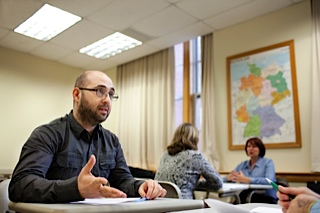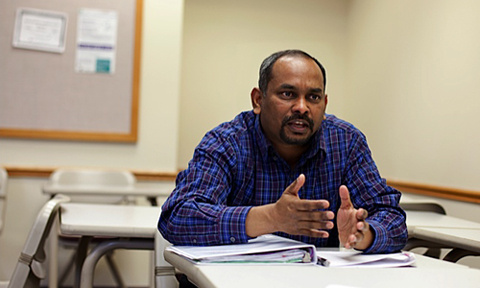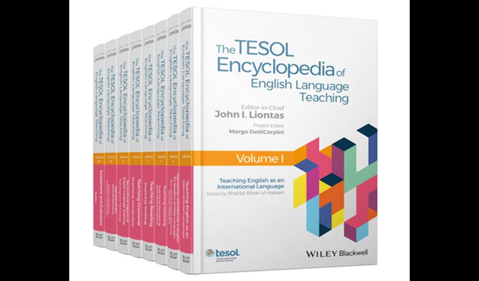Voices filled the room as pairs of graduate students and interviewers performed mock job interviews face-to-face or via Skype.
In ELIP 5320 Oral Communication for the Graduate Researcher, students and community members teamed up for the interview role play on March 25.
“Bringing complete strangers in, especially those with plenty of experience as both applicants and interviewers makes for a more realistic role play and, at the same time, provides an element of safety because of the anonymity of the pairs,” said Lara Wallace, the instructor of the English Language Improvement Program (ELIP) course. She explained that the interviewers were collaborators in this role play, and as such, had volunteered their time to help provide the students with the opportunity to rehearse the way they converse about their research to potential employers.
After the role play, the interviewers shared with their prospective applicants what they felt the applicants’ strengths and weaknesses were in the performance, then provided students with personalized tips and suggestions and shared their own experiences as seasoned interviewers and/or applicants. Some interviewers stayed to participate in the group discussion that followed so that students shared what they learned.
Tips for Interviewing For Jobs in Academia

Mohanad Muslim (graduate student, Geological Sciences), Maria Subert (graduate student, Communication Studies), Cynthia Tindongan (Ph.D. alumna, Cultural Studies, Patton School of Education)
The importance of job applicants “doing their homework” was a theme that the students brought up repeatedly. When applying for jobs in academia, for example, it is important to know what the emphasis is on research and teaching at both the institution and the department within it. Researching faculty bios to learn what others are researching will help the applicant to find his or her place in the prospective department and to highlight it in the interview so that, as one student put it, “It shows that you have thought seriously about the job for which you are applying.”
As an interviewer pointed out, it is helpful for the applicants to view the interview like a date (minus the romance) since the interviewers are not only determining how well-suited applicants are for the job, but whether the personalities will match for a long-term and mutually-beneficial relationship. Thus, not only are the applicants’ answers important, but also the way in which the applicants interact with interviewers is key.
Students in the class found value in preparing answers ahead of time so that they would not be searching for words in an attempt to keep their answers short and clear; the interviewer could ask them to elaborate when necessary. International students were reminded to answer directly, and instead of apologizing for not being native English speakers, to lean on their strengths as being multilingual and multicultural.
About ELIP 5320
Offered every spring, ELIP 5320 offers something for international and domestic graduate students alike, appealing to students in different disciplines. This course is for domestic and international students who will defend their proposals, theses, or dissertations. The primary focus of the course is preparation for the oral defense. Students practice giving presentations, asking and answering questions, discussing, and interacting with professors and peers. Speaking skills and pronunciation are also covered. Read more.
The English Language Improvement Program (ELIP) is an Academic Literacies for Specific Purposes (ALSP) program. We offer graduate and undergraduate courses in academic writing and speaking for international and domestic students. Read more.




















Comments